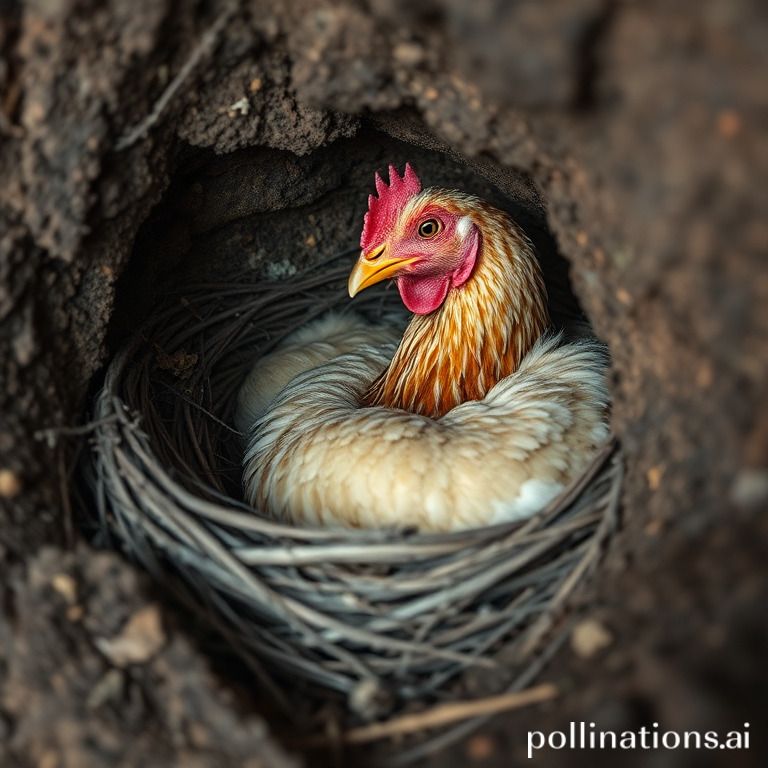Have you ever wondered why chickens bury their eggs? It’s a fascinating behavior that has intrigued poultry enthusiasts for years. Assimilating why chickens engage in this behavior can provide valuable insights into their natural instincts and behaviors.
Many people are curious about whether this behavior is a result of an innate instinct or if there are specific purposes or benefits to burying their eggs. If you’ve ever found yourself pondering this question, you’re not alone. In this article, we will delve into the fascinating world of chicken behavior and explore the reasons behind their intriguing habit of burying their eggs. Get ready to uncover the secrets behind this unique behavior and gain a deeper Assimilating of your feathered friends.
ZenxyHoC Chick Feeder and Waterer Kit
Convenient Feeding and Hydration for Your Chickens
The Natural Instinct of Chickens
1. Investigating the inherent behavior of chickens
Chickens, as captivating creatures, display various natural behaviors that have evolved over time. One such behavior is their instinct to bury eggs. This instinct is deeply ingrained in their genetic composition and can be traced back to their wild ancestors. By examining this inherent behavior, we can gain a deeper Comprehending of chickens and their natural instincts.
2. Factors influencing their instinct to bury eggs
Several factors influence the instinct of chickens to bury their eggs. Comprehending these factors can illuminate the purpose and advantages of this behavior. One crucial factor is the need for protection. In the wild, chickens constantly face the danger of predators, and burying their eggs helps conceal them from potential harm. By burying the eggs, chickens create a natural disguise, making it challenging for predators to locate and destroy them.
Another factor that influences the instinct to bury eggs is the desire to maintain optimal conditions for incubation. Burying the eggs assists in regulating temperature and humidity, providing a suitable environment for the development of the embryos. This behavior ensures that the eggs are shielded from extreme temperature fluctuations and excessive moisture, which could have a negative impact on the survival of the developing chicks.
Moreover, the instinct to bury eggs may also be influenced by the need to establish territory and safeguard valuable resources. By burying their eggs, chickens mark their territory and discourage other hens from laying eggs in the same area. This behavior helps ensure the availability of sufficient resources, such as food and nesting sites, for their own offspring.

Reasons Behind Chickens Burying Eggs
Chickens bury their eggs for two main reasons: protection against predators and temperature regulation for incubation.
1. Protection against predators
Chickens bury their eggs to keep them safe from predators. By burying the eggs, chickens create a hidden and secure nesting environment that predators are less likely to notice. This instinctual behavior helps ensure the survival of the offspring by reducing the risk of egg theft or destruction.
2. Temperature regulation for incubation
Chickens bury their eggs to regulate temperature for successful incubation. By burying the eggs in the soil, chickens take advantage of the earth’s natural insulation properties. The soil acts as a thermal regulator, maintaining a stable temperature for the developing embryos. This behavior is especially beneficial in regions with extreme temperature fluctuations, as it protects the eggs from rapid temperature changes that could harm the incubation process.
| Reasons Behind Chickens Burying Eggs |
|---|
| 1. Protection against predators |
| 2. Temperature regulation for incubation |
Advantages of Egg Burial
Chickens have a unique habit of burying their eggs. At the same time this behavior may seem strange, it actually offers several benefits. Absorbing the advantages of egg burial can provide valuable insights into chicken behavior and instincts.
1. Enhanced Camouflage and Concealment
Burying eggs provides enhanced camouflage and concealment. By burying their eggs, chickens can hide them from potential predators like snakes or other animals that prey on eggs. The soil acts as a natural cover, making it harder for predators to find and reach the eggs.
2. Improved Hatching Success
Burying eggs also improves hatching success. The act of burying helps regulate the temperature and humidity around the eggs, creating an ideal environment for incubation. The soil acts as insulation, protecting the eggs from extreme temperature changes and providing a stable environment for the developing embryos. This stability increases the chances of successful hatching.
Why Do Chickens Bury Their Eggs?
The behavior of burying eggs in chickens is driven by natural instincts. It is believed that chickens bury their eggs to increase the survival chances of their offspring. Burying the eggs helps reduce the risk of predation and provides a suitable environment for incubation.
The benefits of burying eggs go beyond predator avoidance and hatching success. This behavior also helps keep the nesting area clean by keeping the eggs off the ground, reducing the likelihood of contamination or damage. Additionally, burying eggs may be a way of marking territory and indicating reproductive readiness to other members of the flock.

Environmental Factors Impacting Egg Burying Behavior
In regard to the behavior of chickens burying their eggs, there are several environmental factors that have a significant influence. Assimilating these factors can provide valuable insights into why chickens exhibit this behavior. In this section, we will explore two key environmental factors that affect egg burying behavior.
1. Nest Availability and Suitability
Chickens have a strong instinct to find a safe and secure location to lay their eggs. The availability and suitability of nesting sites greatly impact their egg burying behavior. A lack of suitable nesting options may lead chickens to bury their eggs as a means of protecting them from predators or harsh weather conditions.
Furthermore, the quality of the nesting materials also plays a crucial role. Chickens prefer soft and comfortable materials, such as straw or shredded paper, for their nests. These materials not only provide insulation but also contribute to the overall safety and security of the eggs.
2. Influence of Nesting Materials and Vegetation
The type of nesting materials and vegetation present in the surroundings can significantly affect egg burying behavior. Chickens are more likely to bury their eggs in areas with dense vegetation, as it provides natural cover and camouflage.
Additionally, the choice of nesting materials can influence the burying behavior. Chickens prefer materials that allow them to create a deep and secure nest. The availability of suitable materials in the environment can encourage them to bury their eggs rather than leaving them exposed.
| Information |
|---|
| Chickens prefer soft and comfortable nesting materials |
| Dense vegetation provides natural cover and camouflage |
| Availability of suitable materials encourages egg burying |
Differences in Burying Behavior Among Chicken Breeds
Venturing into variations in burying behavior among different chicken breeds can provide valuable insights into their natural instincts and genetic influences on egg burial tendencies. In this article, we will examine the reasons why chickens bury their eggs and shed light on the various factors that contribute to this behavior.
Variation in Natural Instincts
As avian species, chickens exhibit a wide range of natural instincts, including the burying of eggs. This behavior is believed to have evolved as a way to protect eggs from predators and create optimal conditions for incubation. In contrast, the extent to which different chicken breeds engage in egg burial can vary significantly.
Some breeds, like Sussex and Marans, have a strong instinct for burying their eggs. These breeds are known for their diligent nesting habits and will go to great lengths to hide their eggs in secluded spots. They use their beaks and claws to dig shallow holes in the ground. Whilst, breeds like Leghorns and Rhode Island Reds are less likely to bury their eggs and often prefer to lay them in designated nesting boxes.
Genetic Factors Affecting Egg Burial Tendencies
During natural instincts play a significant role in chicken behavior, genetic factors also contribute to the variations in egg burial tendencies among different breeds. Studies have shown that certain genes can influence a chicken’s inclination to bury its eggs.
Research on specific chicken breeds has identified genes associated with nesting behavior and the inclination to bury eggs. These genetic factors can affect a chicken’s nesting instincts, including its desire to dig and bury eggs. By Comprehending the genetic basis of egg burial tendencies, breeders and researchers can gain insights into the heritability of this behavior and potentially manipulate it through selective breeding.
Conclusion
Apprehending egg burying behavior in chickens is crucial for poultry farmers and backyard chicken keepers. By comprehending why chickens bury their eggs, farmers can prevent this behavior and ensure a higher egg yield.
It is essential to provide suitable nesting areas and regular egg collection to discourage egg burying. Moreover, addressing potential causes such as insufficient nesting boxes or stress factors can help in tackling this issue effectively. By prioritizing the well-being and needs of chickens, farmers can create a conducive environment for healthy egg production and overall chicken welfare.
Faq about Chicken Egg Burying
FAQ 1: Why do some chickens not bury their eggs?
Not all chickens bury their eggs because burying behavior is not instinctual for all breeds. Some chickens have lost this natural behavior through selective breeding or domestication.FAQ 2: Can chickens be trained not to bury their eggs?
Yes, chickens can be trained not to bury their eggs. By providing suitable nesting boxes with soft bedding material and ensuring regular egg collection, chickens can be encouraged to lay their eggs in the preferred location, reducing the tendency to bury them.FAQ 3: How deep do chickens bury their eggs?
Chickens typically bury their eggs at a depth of about 2 to 6 inches (5 to 15 cm) in the ground or bedding material. The depth may vary depending on the individual chicken and its nesting preferences.FAQ 4: Do roosters participate in egg burying behavior?
No, roosters do not participate in egg burying behavior. This behavior is primarily exhibited by hens as a way to protect and incubate their eggs.FAQ 5: What can I do to encourage or discourage egg burying in my chickens?
To discourage egg burying, provide suitable nesting boxes with clean and comfortable bedding material. Collect eggs regularly to prevent hens from feeling the need to bury them. Nevertheless, if you want to encourage egg burying for brooding purposes, provide a separate area with suitable nesting materials where hens can exhibit this behavior.Read Similar Post:
1. What To Give Chickens For Diarrhea?
2. When To Worm Chickens?

